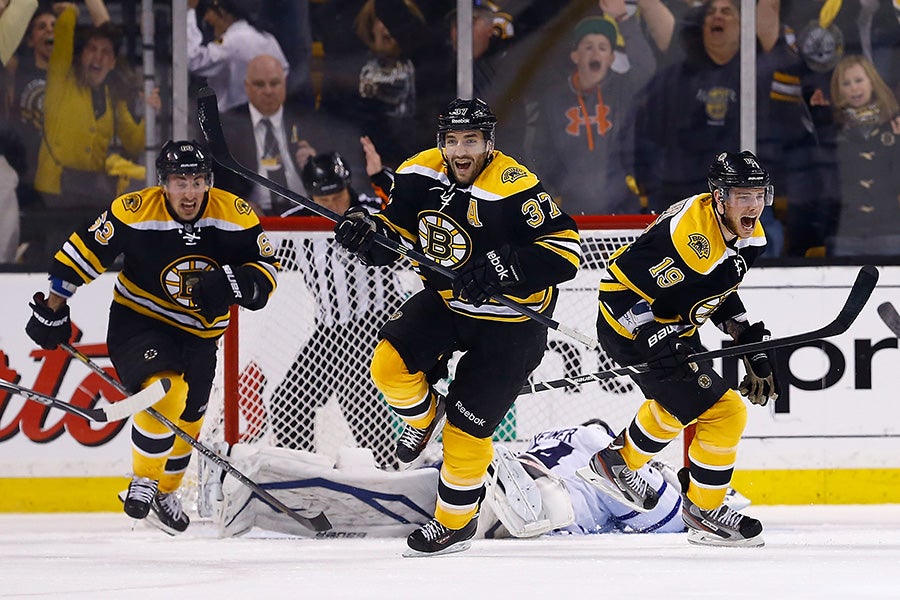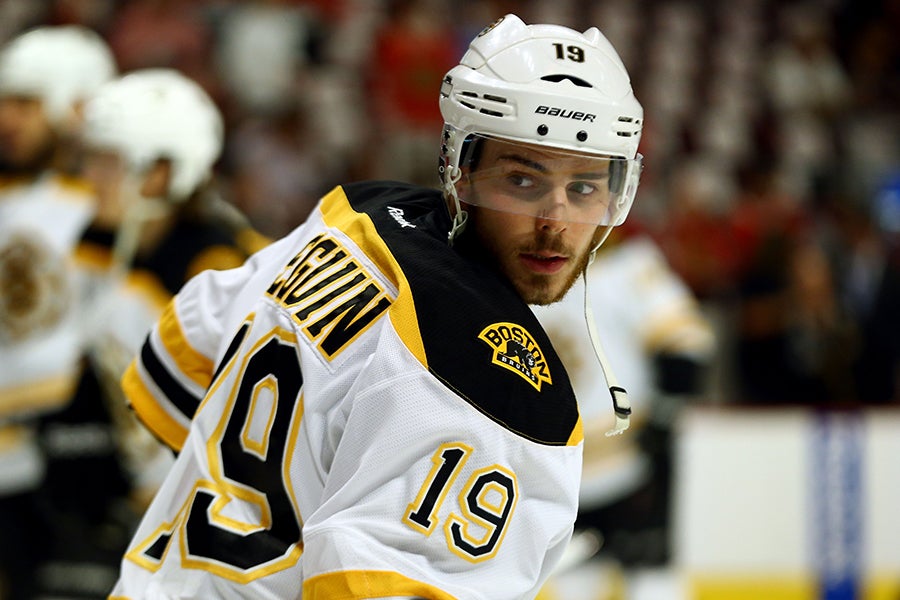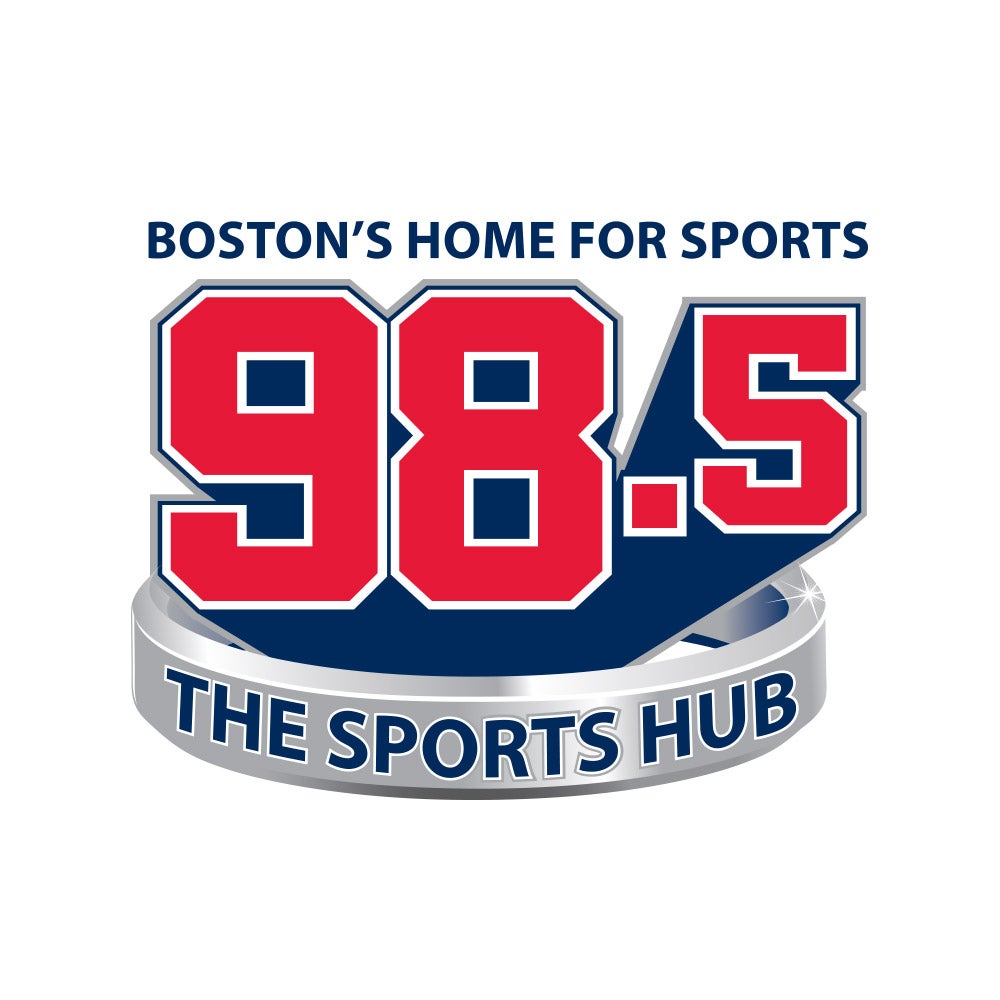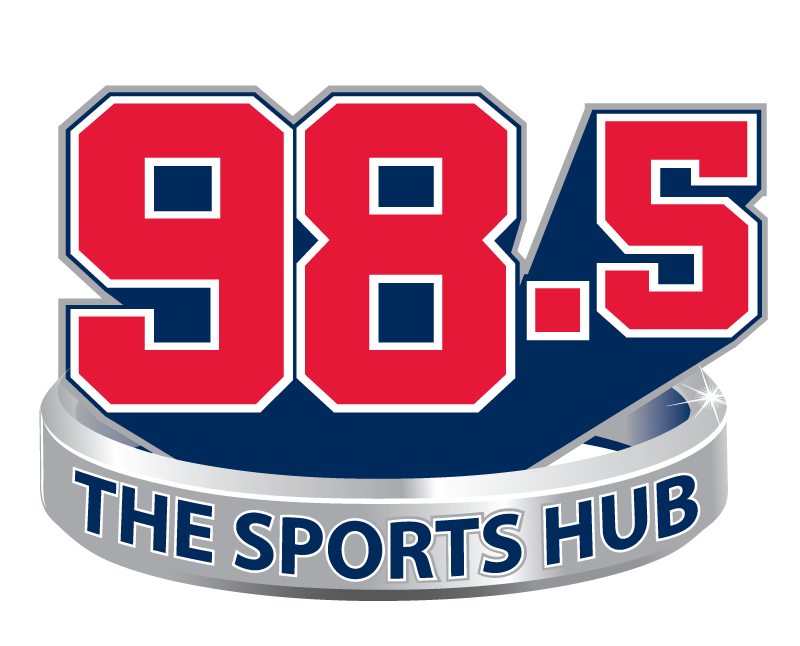Missed Opportunity: The Bruins and the 2013 Stanley Cup Final
The 2013 Boston Bruins were an exciting and ultimately memorable team that, like several of the past decade, came up just short of the ultimate prize.

BOSTON, MA – JUNE 24: Jonathan Toews #19 of the Chicago Blackhawks and Michal Handzus #26 of the Chicago Blackhawks celebrate a goal late in the third period against Dennis Seidenberg #44 of the Boston Bruins in Game Six of the 2013 NHL Stanley Cup Final at TD Garden on June 24, 2013 in Boston, Massachusetts. (Photo by Harry How/Getty Images)
Harry How/Getty ImagesProgramming Note: On Monday, 98.5 The Sports Hub will air the Boston Bruins and Chicago Blackhawks in Games 2 and 3 of the 2013 Stanley Cup Final. Click here for the full on-air schedule.
By Sean Sylver, 98.5 The Sports Hub
The 2013 Stanley Cup Final between the Bruins and Blackhawks pitted two Original Six franchises who had seemingly been on a collision course for years. The result would alter the path of hockey history.
Both squads emerged from a mid-2000s slumber awash in young talent, primed to challenge for the Stanley Cup for the next decade-plus. The Bruins returned the playoffs in 2008, with the Blackhawks following the next year, reaching the Western Conference Finals despite long odds. Chicago raised the Cup in 2010, while Boston hoisted the trophy in 2011. Both teams disappointed in 2012, with first-round playoff exits.
Once players and owners came to their senses and ended yet another hockey lockout, they were back on track for a 2013 clash.
“Chicago was pretty clearly the best team in the league for most of that shortened season,” remembers Ryan Johnston, host of The Hockey Show and Johnston & Flynn on 98.5 The Sports Hub. “They started off on a 24-game point streak!”
The Bruins continued to find success under coach Claude Julien. Many of the principals from 2011 had returned - Patrice Bergeron, Milan Lucic and David Krejci were in their primes. Zdeno Chara and Dennis Seidenberg (before his career was altered by injury) remained the top defensive pairing. Johnny Boychuk hadn't been traded yet.
21-year old Tyler Seguin was a rising star and Brad Marchand emerged, leading the team in points during the regular season.
The big change was in net. Part-time acrobat Tim Thomas was replaced by Tuukka Rask, who looked perhaps even more dominant than Thomas in posting a 2.00 goals against average and .929 save percentage during the regular season.
But Boston's depth - a key in 2011 - had suffered, Johnston says.
“On D, the only change was swapping in a young Torey Krug for a mostly worthless Tomas Kaberle. Up front is where some of the differences stand out. (Mark) Recchi and (Michael) Ryder were such a huge part of the 2011 win. In '13, you had an ancient (Jaromir) Jagr, Kaspars Daugavins and Carl Soderberg playing those roles.”
The Blackhawks dropped just five games through three playoff rounds on their way to the Final. Meanwhile, the Bruins struggled to get out of the first round against Toronto, but got the boost they needed from a stirring Game 7 comeback victory that also served as a much-needed salve for a city still wounded by the Boston Marathon bombing.
 Jared Wickerham/Getty Images
Jared Wickerham/Getty ImagesThe Bruins' 2013 comeback win over the Maple Leafs would carry more weight if the team won the Stanley Cup. (Photo by Jared Wickerham/Getty Images)
“The 4-1 comeback in Game 7 against Toronto was a game that will be remembered forever. With everything that happened in (the city) earlier that year, you definitely felt like the players were playing their hearts out for Boston,” recalls Sports Hub producer Kevin Maggiore.
The Bruins ripped off wins in eight of the next nine to arrive on Chicago’s doorstep for Game 1.
“In the Rangers series, Torey Krug came out of nowhere and scored a goal in four of the five games," Maggiore remembers. "That run kick-started his career in the NHL. And the four game sweep of the Penguins - Tuukka Rask allowing just two goals in four games to a team that had Sidney Crosby, Evgeni Malkin, Jarome Iginla, James Neal, and Kris Letang was just insane.”
The opening game in Chicago would be a missed opportunity for the B's.
“Boston broke down and blew leads in the third period multiple times in that series," Johnston recollects. "They were up 3-1 in the third period on the road in Game 1, let Chicago tie it, and lost in triple overtime. You have to win that game.”
The Bruins took Games 2 and 3, with Rask yielding just a single goal to the Blackhawks. Game 4 would be an uncharacteristically high-scoring affair, with Chicago pulling off the 6-5 victory. They then wrested control of the series with a Game 5 win on home ice. It was clear the Hawks were a tougher customer than Vancouver had been two years prior.
“They weren’t going to fold (like Vancouver)," says Johnston. "The Bruins were facing a battle-tested team. Experience tends to matter a lot in the playoffs. Their best players - Kane and Toews - made big plays when they needed them. Chicago's defensemen like (Duncan) Keith, (Johnny) Oduya, (Brent) Seabrook and (Niklas) Hjalmarsson - those guys were horses.”
Down 3-2 in the series, the Bruins had a late lead in Game 6 with a chance to send it to a seventh and deciding contest back at the United Center. Your memory of what happened next might depend on the kind of narrative you want to push when you're calling into the Sports Hub.
"It wasn't Tuukka's fault," Johnston contends. "Boston had defensive breakdowns on both of those goals. Lucic got caught watching on the game-tying goal. The game winner was a deflected shot that hit the post and (Dave) Bolland was quicker to react than both Boychuk and (Andrew) Ference."
Patrick Kane (nine goals and 10 assists in the postseason) walked away with the Conn Smythe trophy. David Krejci - with 27 points - had a pretty strong case for the hardware. But the reputation of Rask, a presumptive MVP favorite with a .940 save percentage and downright stingy 1.88 goals against average in the playoffs, was perhaps most hurt by the loss.
"It's unfortunate that Rask isn't more appreciated than he is because, statistically speaking, he’ll go down as the best goalie in the history of the team," predicts Maggiore. "His only problem is that Boston measures success in championships and he doesn’t have one as a starter."
The loss would also be Tyler Seguin's last game in black and gold.
 Bruce Bennett/Getty Images
Bruce Bennett/Getty ImagesGame 6 of the Stanley Cup Final would be Tyler Seguin's final game as a Bruin. (Photo by Bruce Bennett/Getty Images)
"Seguin's lack of production in that '13 playoff run and especially in the Final was a big problem," Johnston points out. "He could have been the difference maker. Only one goal in 22 playoff games, and none in the Final?"
The scapegoats identified, Bruins fans looked for solace in other places.
"I don’t blame injuries because I know Chicago had some too," Maggiore admits, "but I’d like to replay that series with a fully healthy - or at least close to healthy - Bergeron, Chara, Nathan Horton and Gregory Campbell and see if it turns out differently."
Chicago’s triumph would be the second of three Cups in six seasons, getting their names inscribed again in 2015.
Other teams, like the Los Angeles Kings and Pittsburgh Penguins, tallied multiple Cup wins before the Bruins got back to the Final in 2019, a seven game loss to St. Louis.
Regular season successes and playoff near-misses don't change the fact that the Bruins still haven’t hoisted the most prestigious trophy in all of pro sports since a June night in Vancouver, nearly nine years ago.
Missed opportunities.
"It just feels like the decade was great," Maggiore laments, "but could’ve been better."
Sean Sylver can be heard on 98.5 The Sports Hub. You can find him on Twitter @TheSylverFox.








